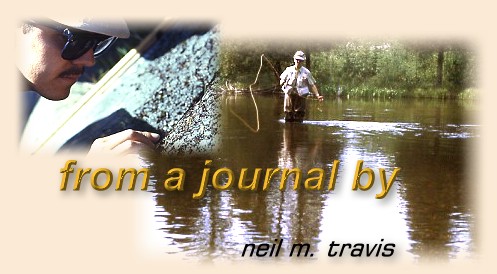OPINIONS AND DISAGEEMENTS
You don't have to be involved with fly fishing very long before you discover that fly fishers are, for the most part, quite opinionate people. This has been so since the earliest days of the sport. Read any of the early fly fishing books and it will quickly become evident that fly fishers have been debating various aspects of fly fishing since its earliest days. Unfortunately, it also became evident that the opinions could quickly become a source of disagreement and some of them even reached the stage of name calling. The word war between wet fly and dry fly anglers reached such a fever pitch that certain waters were restricted to dry flies only. The rules even went so far to restrict the angler not only to the use of dry flies but also how even dry flies could be used. These rules are still in effect on certain streams in England.
It's unfortunate that personal opinions about a sport like fly fishing can become a source of such disagreements. A quick check of the posts on almost any fly fishing bulletin board will show that strong disagreements still exist in the fly fishing community, and that these disagreements can quickly escalate to name calling and personal insults. That's truly sad because we grow as individuals when we consider the opinions and experiences of others. That doesn't mean that we will change our opinion but we just might learn something in the process.
Recently Tenkara style fishing has become somewhat of a fad among those in the fly fishing community. Since Tenkara fishing does not involve the use of a reel and casting is limited to the length of the line attached to the tip of the rod [technically to a loop attached to the uppermost section of the rod], the question has been raised about whether or not this is really "fly fishing." Well, if we go back to the earliest descriptions of fly fishing it would appear that it is more truly fly fishing than what we practice today.
However, the question is really pointless. It might not be your idea of how one should "do" fly fishing but it still meets the basic definition of fly fishing – using a lure constructed from feathers or other similar materials and which is presented to the fish using the weight of the line and not the lure. [A rough distillation of a legal description of what constitutes fly fishing] It may not be your method of choice but for some anglers it is the only way to go.
I have made it clear in previous articles that I don't believe that fluorocarbon leader material is superior to standard nylon leader material since I don't believe trout have the ability to connect the appearance of a leader with a threat. However, if you prefer to use fluorocarbon rather than nylon for your leaders and you believe that it makes a difference in your success it is of little concern to me. Certainly it is not something that should raise a verbal battle over the virtues of one material over the other.
Given the choice I will fish dry flies, however I also fish nymphs and emergers when not using them would result in an activity that is futile. I will sit and wait for a hatch rather than spend time dredging the bottom with a nymph, but that does not make me somehow nobler than the angler that is flinging weighted nymphs while I sit on the bank.
I'm a "scientific angler." I revel in identifying the hatches, observing the feeding fish and determining what the fish are doing and presenting my offering in such a manner that it will duplicate, as close as possible, what the fish are eating, either as fly fished on the surface, in the surface film, just below the surface or anywhere between the surface film and the bottom. I fully realize that many fly fishers don't approach fly fishing in that manner, in fact I am probably an anomaly among the majority of modern day fly fishers. However, since I hold to the belief that fly fishing is a recreational activity in which a person indulges themselves that has no value beyond that which is derived from the activity itself. In short, fly fishing; however it's practiced, is an end in itself. If your idea of being a scientific angler is purchasing a certain brand of fly line may you proceed in peace.
Most of what we practice in fly fishing is founded on opinions that, from a scientific standpoint, cannot be proved or disproved. Two anglers fishing in the same pool both using entirely different techniques may both be catching fish. Two anglers using the same techniques while fishing the same pool may have entirely different results. How do we explain that?
"I disapprove of what you say, but I will defend to the death your right to say it"* is a famous quote often attributed to Voltaire, but regardless of who actually said it, it is a good quote for fly fishers to live by.
*The actual quote came from a book written about the life of Voltaire by Evelyn Beatrice Hall.
